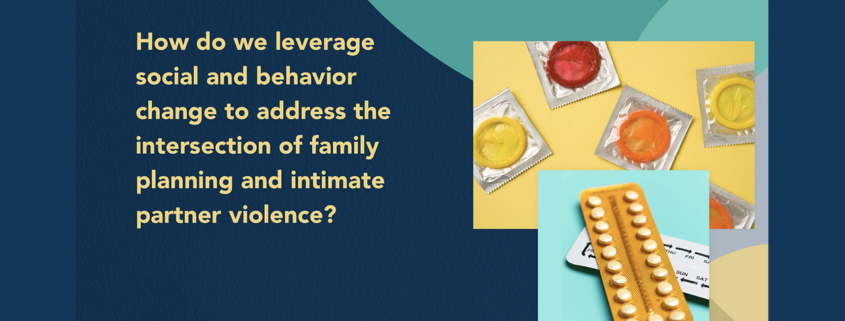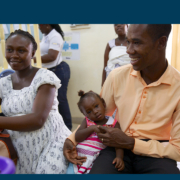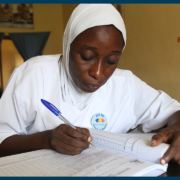Family Planning and Intimate Partner Violence: An Intersection Deserving of More Attention
Written by: Danette Wilkins, Program Officer, Breakthrough ACTION
Intimate partner violence (IPV) significantly impacts family planning (FP)-related behaviors and outcomes, including reproductive autonomy, pregnancy, and childbearing decision-making, contraceptive preference, and contraceptive uptake and continuation.1-6 However, integrated programming addressing both FP and IPV is rare.7 FP practitioners need more research and programming that integrate both health issues—inside and outside of health facilities—to build an understanding of and address these linkages, especially the connection between underlying gender and social norms.
Patriarchal values that uphold gender-inequitable norms and roles, including male control over women, influence the acceptability and use of FP methods and IPV perpetration. Individuals across gender identities can support these restrictive gender and social norms, which are firmly embedded in societies (e.g., male dominance), systems (e.g., healthcare and education), and structures (e.g., laws and policies). Social and behavior change (SBC) approaches can help identify and shift gender-inequitable norms, roles, and dynamics that account for the link between FP and IPV.
Earlier this year, Breakthrough ACTION hosted the expert consultation Seeking Breakthroughs in Social and Behavior Change at the Intersection of Family Planning and Intimate Partner Violence to build on the work of others in strengthening understanding of the linkages between FP and IPV. The consultation facilitated consideration of influencing factors across the socio-ecological model and the life course. Additionally, Breakthrough ACTION highlighted SBC approaches, including human-centered design, audience segmentation, and behavioral economics that are currently underutilized in integrated FP/IPV programming and offer an opportunity to expand and advance this type of programming.
Breakthrough ACTION is pleased to launch a new interactive online feature that provides takeaways, recommendations, and links to a detailed technical brief in English, French, and Spanish (forthcoming). Additionally, the Resource Hub provides access to the slides from presentations and the recordings of presentations on YouTube.
CONSULTATION RESOURCES
FP and IPV Interactive Online Feature
Technical Brief: English | French | Spanish
ADDITIONAL RESOURCES
Intimate Partner Violence and Family Planning: Opportunities for Action
What’s Family Planning Got to Do with Intimate Partner Violence?
REFERENCES
- Chen, G. L., Silverman, J. G., Dixit, A., Begum, S., Ghule, M., Battala, M., Johns, N. E., Raj, A., & Averbach, S. (2020). A cross-sectional analysis of intimate partner violence and family planning use in rural India. EClinical Medicine, 21, 100318. https://doi.org/10.1016/j.eclinm.2020.100318
- Delamou, A., Samandari, G., Camara, B. S., Traore, P., Diallo, F. G., Millimono, S., Wane, D., Toliver, M., Laffe, K., & Verani, F. (2015). Prevalence and correlates of intimate partner violence among family planning clients in Conakry, Guinea. BMC Research Notes, 8,814. https://doi.org/10.1186/s13104-015-1811-7
- MacQuarrie, K. L. D., Mallick, L., & Kishor, S. (2016). Intimate partner violence and interruption to contraceptive use. DHS Analytical Studies No. 57. Rockville, Maryland, USA: ICF International.
- Silverman, J. G., Challa, S., Boyce, S. C., Averbach, S., & Raj, A. (2020). Associations of reproductive coercion and intimate partner violence with overt and covert family planning use among married adolescent girls in Niger. EClinical Medicine, 22, 100359. https://doi.org/10.1016/j.eclinm.2020.100359
- Underwood, C. R. & Casella, A. (2021). Intimate partner violence, family planning, and gender norms: Evidence from selected demographic and health surveys. Baltimore, Maryland: Johns Hopkins Center for Communication Programs.
- Wandera, S. O., Kwagala, B., & Odimegwu, C. (2018). Intimate partner violence and current modern contraceptive use among married women in Uganda: A cross-sectional study. The Pan African Medical Journal, 30, 85. https://doi.org/10.11604/pamj.2018.30.85.12722
- Institute for Reproductive Health, Georgetown University. (2017). What’s family planning got to do with intimate partner violence? Exchanging with experts at the 2017 SVRI Forum. https://irh.org/fp-and-ipvsvri-2017/


 Cambey Mikush/Photoshare
Cambey Mikush/Photoshare Sara Holbak/VectorWorks/Photoshare
Sara Holbak/VectorWorks/Photoshare Sarah Hoibak/VectorWorks/Photoshare
Sarah Hoibak/VectorWorks/Photoshare Rebekah Munnikhuysen/US Peace Corps/Photoshare
Rebekah Munnikhuysen/US Peace Corps/Photoshare Getty Images/Image of Empowerment
Getty Images/Image of Empowerment © 2012 CCP/NURHI 2, Courtesy of Photoshare
© 2012 CCP/NURHI 2, Courtesy of Photoshare